Tim Stutzer is riding into the sunset
German age group triathlete and Team Timex member Tim Stutzer has been doing triathlons forever, but knee issues are forcing him now to ride into the sunset. But maybe the timing is just right for him, or at the very least he appears ready for some changes.
Slowtwitch: Tim, thanks for your time.
Tim Stutzer: It is my pleasure and an honor to get your call, Herbert. Good to hear from you again.
ST: What are you actually up to as we speak?
Tim: Right now I am making the Christmas present for my girls. So I can’t really talk about it.

ST: Well, talk about your day job
Tim: I’ve been with the European Central Bank for the last two and a half years now and helped building their banking supervision. As a lawyer I’ve been involved in numerous areas. With everything that’s going on in Europe these days from Greece, the Brexit vote earlier this year and on top of it all the unknown effects of the recent American elections it is exciting times for sure!
ST: When I saw you in Kona last month you announced that it was your final long course triathlon. I think injuries forced your hands here.
Tim: Yup, last one! I have been battling on and off knee issues for the last 10 years. Had silly accidents that required a total of three surgeries on the inner meniscus. Both knees. And with all that running this does not get better. I was able to KQ at IRONMAN Wales 2015 on very limited running mileage. But when you limp up the stairs after every run either at sub 6 minute/mile pace or a long easy run over 90 minutes, it is evident that it is time. Also, I used to be a rather strong cyclist and had to build a significant lead before the run. Now at 43 and with way less bike mileage the style of racing I would have had to get used to in years to come did not really sound too promising. So I chose to close the long distance chapter this year with the incredible Celtman and then a final outing in Kona to soak it all in and say goodbye to the sport.
ST: Never again?
Tim: I know to “never say never.” Even Sean Connery returned to the Bond franchise after 20 years. Old men can do foolish things.
ST: I know you have done triathlons all these years, and well, but isn’t your heart into cycling anyway?
Tim: Well, I started out with just cycling. The woods around my home town were our playground with our first mountain bikes in the late 80 and early 90s. In triathlon the bike has always been the strongest among the three disciplines. This made a lot possible and I have to admit: I’m still proud that I have an IM bike course record in my palmares (Ironman UK ‘08).
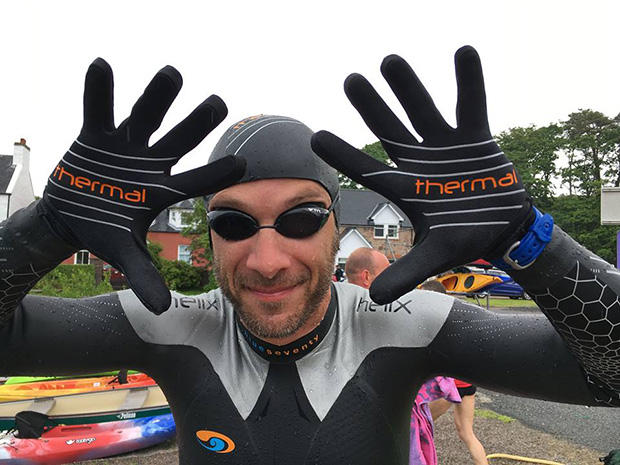
ST: When did you actually start in triathlon and what exactly inspired you?
Tim: My first race… Cologne on September 14, 1984 – the day before the first long distance race in European. My dad and the 10 year old me embarked on a journey of a 350 meter swim, 25k on the bike and 8k run. So there was my dad introducing me to the sport. He went on to a Kona AG podium in 1994. But I had not gotten hooked just yet! I only did the occasional triathlon through the 80s and 90s. That Ironman thing though always remained an idea and my best buddy did his first one in Roth in ‘99. And when I had finished law school we both signed up for what turned out to be the last Ironman in Roth 2001. We had a blast. In 2002 they moved Ironman Germany to Frankfurt. At the time I lived barely 100 meters from the run course. I had to do this one, too. A hometown Ironman race – how could I resist? But the real virus only caught on when I got my first coach in 2006 and realized that I had some potential at this. Then I was really hooked.
ST: How many times have you raced in Kona and when were you there for he first time?
Tim: This year was my fifth time. I was in Kona for the first time in 2004 to be with my dad who raced. I first raced in 2007 – a lottery ticket for Christmas in 2006. Since then I tried to really race Kona several times. But despite some really decent preps the heat always broke me. As I have learned over the years, guys made for low temperatures and difficult bike courses like me should stick to their home turf.
ST: Has Kona changed over these years?
Tim: Oh yes indeed it has. And I don’t really know where to start. It has changed in so many aspects. But for sure the most important thing is that over the 12 years I’ve been able to observe, the race has tried to keep up with the growth of the sport. But I believe it is too much for the race as it is currently run. There are now more than 40 qualifying races all over the world, right? More and more people are being infected by the IRONMAN virus. That brings a field to the Kona in which the average Joe is much faster than 10 years ago and well, I think the scenes from this year speak for themselves. It is sad to say that as things stand I can’t recommend Kona as a race. You might do it for the experience but do not expect a fair race. To race Kona in 2016 outside the top 50 overall meant to accept that either you are willing to enter the drafting game or willing to give up any chance for a place up front. Luckily I had made my decision long before the gun went off.
The situation is in part due to the athletes’ attitude. Some fraction of us type 1 personalities will always do certain things to get a great result. By and large though, this is a challenge for race organizers. They could certainly do more. And it is necessary for not only Kona Look at other races like Barcelona, Brazil and Cozumel. It is as far away from an individual time trial as it gets. Bottom line, something has to be done to save the race. Waves per age group, many more marshals out on the bike course and a 10 minute penalty for drafting are all valid options have to be explored. But honestly I’d be surprised if anything happened at all.
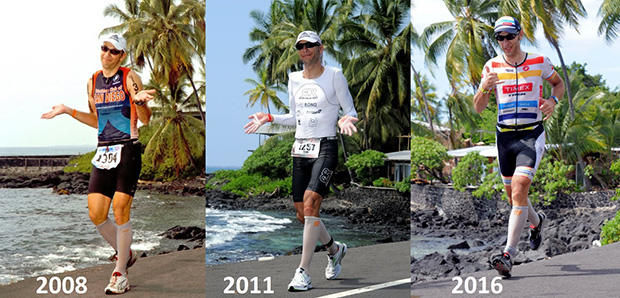
ST: What about doping? In your view how common is it in the age group world in triathlon?
Tim:I think it is indeed a huge issue. First, a sport that combines three endurance disciplines is one of the most susceptible to doping. Then, long distance racing tends to suck you “all in”. It dominates your life in ways that not many other sports do. And within your peer group a KQ is the Holy Grail. There is a high motivation to do everything to get there and most triathletes have the necessary funds to afford, say EPO. On top of this comes a society that denies aging and sees it as a disease to be treated – for men with testosterone. Kind of a perfect storm, is it not? So what we need is more much testing. Even though there has been targeted age group testing by WTC since I believe 2012 when they caught Kevon Moats, we need to see more of this. Triathletes are on average rather smart people and simply won’t be caught when you test them during race week.
ST: If you could do one more triathlon, long or short, which one would you choose to do?
Tim: It’d be a duathlon actually “City to Summit” in Scotland. It is one long day by bike and on foot from Edinburgh Castle across the Scottish Highlands to the top of Ben Nevis. I’ve hiked and biked large parts of the course over the last 20 years and am kind of addicted to the Highlands. Bummer is that the run part adds up to 63.3km. So, no way for me.
ST: Looking back, what was your most memorable race you have done?
Tim: Despite Kona, despite almost cracking top10 at an Ironman I have to say it was the very first Ironman in Roth 2001 for so many reasons: For the fact that it is the only race I can give you my time even if you wake me up in the middle of the night (12h 11min 51sec). For the fact that I won’t forget that guy trying to sprint me down with 20m to go – and me not giving up. Totally crazy thing to do, but well worth it. The finish line picture even has my best friend laughing his brains out. This day keeps me coming back to Roth every year. And every year I have goose bumps when taking the Allersberg exit from A9.
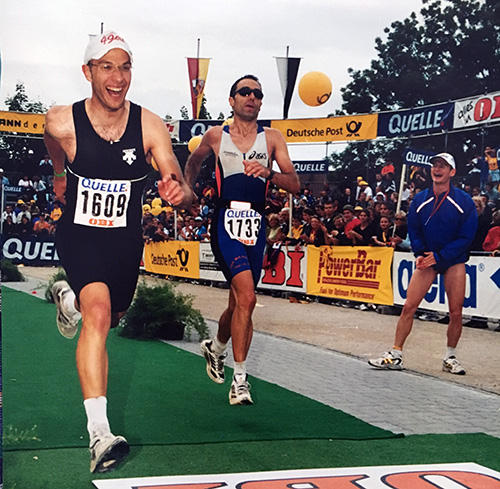
ST: You are still fairly young, and in your case an injury helped your decision, but it seems to me that Germans walk away sooner from Ironman racing than their North American and Asian Pacific counterparts. Is that a valid observation?
Tim: Thank for the compliment. But it is years that in the sport that count in the end. And after 15 years in the sport it would have been time anyway to think about what the sport has to give me in the years to come. And here I think you are right. Germans (perhaps Europeans in general), at least those that compete at a high level general seem leave the sport earlier than their American counterparts. Why is that? First, I think they start it earlier. Triathlon over here has been popular with students over that last 20 years. College triathlon in the US on the other hand is just picking up speed. Many of the fast guys moved through the ranks and have become pros. The majority though raced age group until the 35-39 age group.
Second, Germans in particular tend to start their families later than Americans. And then with kids in school family tends to take over. If then in parallel your career picks up speed reality takes over.
Third, once you have reached a certain level – for some just outside the pro bubble – it is difficult to accept that the style of racing inevitably changes when you grow older. This holds especially true for races like Kona where in recent years the Ironman is no individual race anymore. Once you reach the mid-40s you will be part of the school bus to Hawi so to speak. For strong cyclists like me that is indeed very frustrating. I simply would not get the lead on the swim/runners in T2 I’d like to have. This is why I moved away from flat races a few years ago. Race to your strengths is what they say, right? And I don’t regret to have been to the challenging courses in the circuit. And also for others realizing that the sport is a different one when not raced at the very front, is a great disappointment. It is indeed hard to accept. And as we see from the Kona example it does not get better.
ST: So what is next?
Tim: Luckily, there is a whole world out there with plenty to do that does not involve running. And cycling my real passion I’ve already teamed up with a few friends for a four person relay at the 24h bike race on Nuerburgring. Challenge Roth relay is also on the map as well as most probably a mountain bike stage race. That is indeed enough to keep me busy until I finally succumb to the Golf virus for retirement.
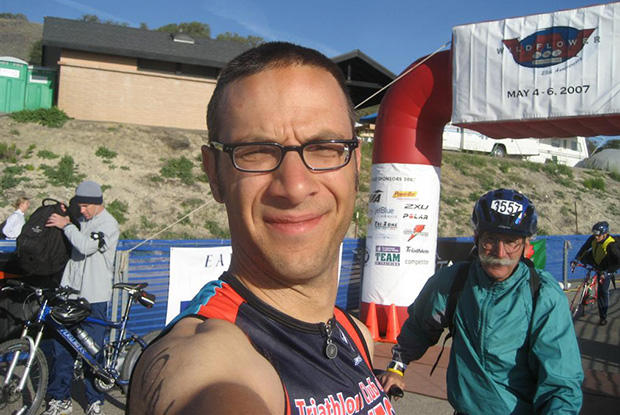
ST: Is there anything else we should know?
Tim: Working in San Diego in 2007 joined the SD Tri Club and made great friends there. And even got to do Wildflower on the last weekend in California. A real pity it is gone now. A winding road and six years later this led to the Timex team taking me on board in 2013 Even though the sport is the first thing we have in common, the friendships made there go far beyond this alone. I am known as “Ze German” on that team. It is amazing what this sport can give you and I am really thankful for that. One more thing Herbert: We have to have a Pyraser Pils when you come to Roth next summer!
ST: Well, I am already signed up for SwimRun Engadin on July 9th.
Tim: Obviously, you have to change your plans then. See you there!


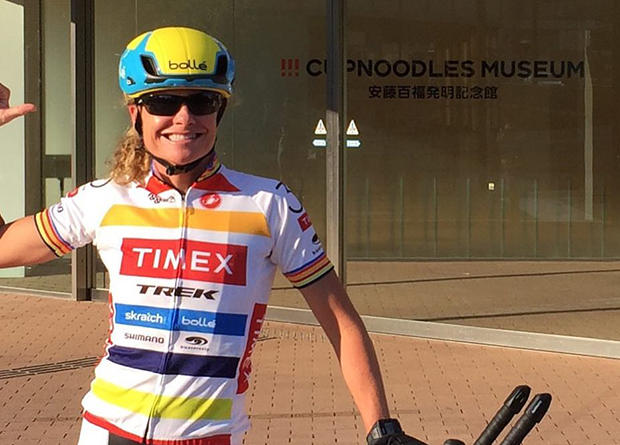
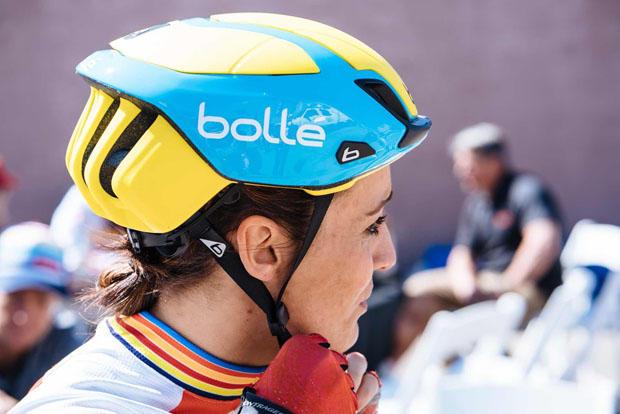
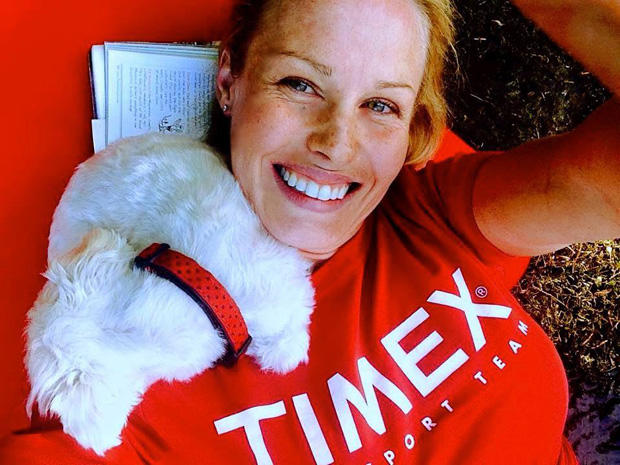
Start the discussion at slowtwitch.northend.network